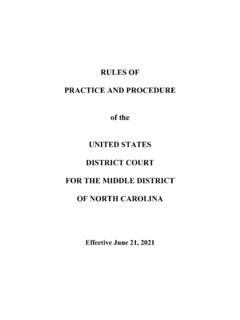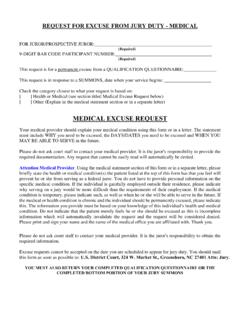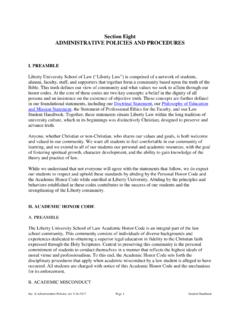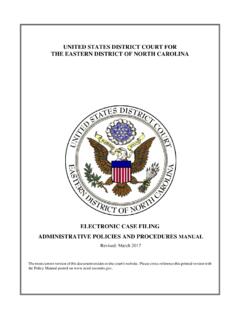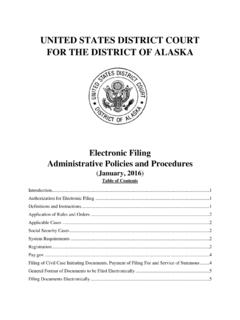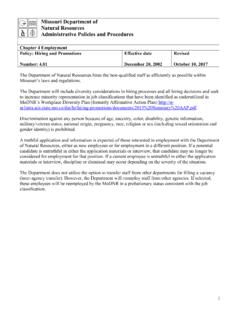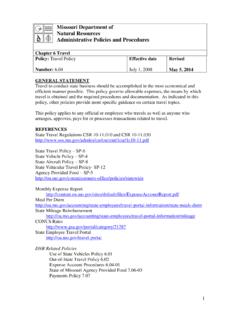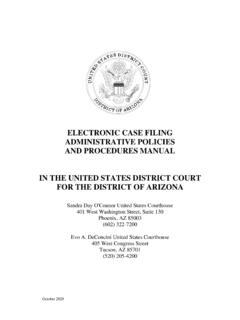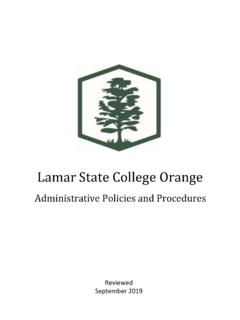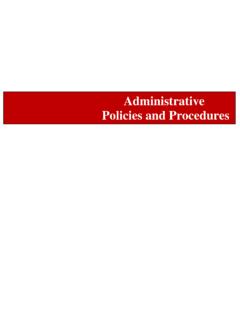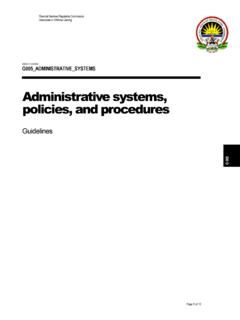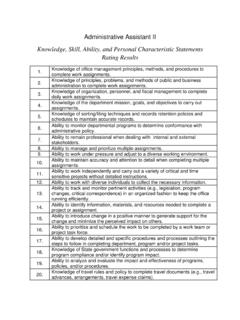Transcription of UNITED STATES DISTRICT COURT MIDDLE DISTRICT OF …
1 UNITED STATES DISTRICT COURT MIDDLE DISTRICT OF NORTH CAROLINA ELECTRONIC CASE FILING ADMINISTRATIVE policies AND procedures MANUAL Revised May 25, 2017 Table of Contents Glossary of Terms .. 2 A. General Information .. 3 B. Registration & Passwords Attorneys and Pro Se Parties .. 4 C. Filing and Service of Civil Case Opening Documents .. 6 D. Electronic Filing .. 7 E. Service of Electronically Filed Documents .. 8 F. Deadlines .. 9 G. Special Filing Requirements and Exceptions .. 9 H. Hyperlinks in Documents .. 10 I. Signature .. 11 J. Privacy .. 13 K. Attachments to Filings and Exhibits (other than hearing and trial exhibits) .. 13 L. Orders and Judgments .. 15 M. Correcting Docket Entries .. 17 N. Transcripts .. 18 O. Facsimile Transmissions.
2 18 P. Technical Failures .. 18 Q. Access to Electronically Stored Documents .. 19 Form 20 Form B .. 21 Form 22 Form D .. 23 Form 24 Form 25 Form G .. 26 UNITED STATES DISTRICT COURT MIDDLE DISTRICT OF NORTH CAROLINA ADMINISTRATIVE procedures GOVERNING THE FILING AND SERVICE BY ELECTRONIC MEANS ELECTRONIC FILING AND PDF DOCUMENTS Local Rule requires electronic filing in conjunction with Federal Rules of Civil Procedure 5(d) (3) and 83 and Federal Rules of Criminal Procedure 49 and 57. The following procedures govern electronic filing in this DISTRICT unless, due to extraordinary circumstances in a particular case, a judicial officer determines that these policies and procedures should be modified in the interest of justice. Electronic filing is the process of uploading a document from the registered user s computer, and then using the COURT s internet-ba sed case management/electronic case files (CM/ECF) system to file the document in the COURT s electronic case file.
3 The ECF system only accepts documents in a portable document format (PDF). The two types of PDF documents that are accepted for filing in CM/ECF are as follows: 1. Electronically converted PDFs are created from word processing documents (MS Word , WordPerfect etc.) using Adobe Acrobat or similar software. They are text searchable and their file size is small. 2. Scanned PDF s are created from paper documents processed through an optical scanner. Most scanned PDFs are not searchable and have a large file size. Because documents scanned in color or containing a g raphic take much longer to upload, filing parties must configure their scanners to scan documents at 300 dpi and in black and white rather than in color. Documents appearing in color in their original form, such as color photographs, may be scanned in color and then uploaded to CM/ECF.
4 2 Glossary of Terms Clerk s Office The office of the MIDDLE DISTRICT of North Carolina that serves as the official custodian of the records and assists the public with filing. CM/ECF or CM/ECF s ystem The Case Management/Electronic Case Filing system that serves as the official filing record in the MIDDLE DISTRICT of North Carolina. Conventionally Filing a document with the in paper either in person with the Clerk s Office or by mail. Duplicate Payment Electronic payment that is inadvertently made twice in the CM/ECF system. Filing User An attorney who is registered to file electronically or a pro se party who has filed a motion and received approval of the assigned Judge to file electronically in a particular case. NEF Notice of Electronic Filing email that is generated by the CM/ECF system to all Filing Users and Registered Users as notice of a filed pleading or activity in a federal COURT case.
5 Non-Registered Party A party who does not file electronically nor receive electronic service of documents by CM/ECF. Registered User A pro se party who has consented to receive electronic service of documents to the extent and in the manner authorized by the Federal Rules of Civil Procedure, the Federal Rules of Criminal Procedure, and the Local Rules and signed an Authorization Form to Receive Documents Electronically. 3 A. General Information (1) Effective March 1, 2005, registered CM/ECF users were authorized to file documents electronically, except those exempted in Section G of the administrative procedures . Effective January 1, 2006, attorneys were required to use CM/ECF to file all documents not otherwise exempted. (2) Any document electronically filed or converted by the UNITED STATES DISTRICT COURT for the MIDDLE DISTRICT of North Carolina (Clerk s Office) to electronic format on or after March 1, 2005 shall be the official record of the COURT .
6 As such, the Clerk s Office will not maintain a paper record for these documents. (3) All documents filed by electronic means must comply with technical standards, if any, established by the Judicial Conference of the UNITED STATES or by this COURT . (4) A case filed under seal will be sealed electronically in CM/ECF until the assigned Judge orders the case unsealed. (5) An attorney may for good cause move to file documents conventionally. Even if the assigned judge initially grants an attorney permission to file documents conventionally, the assigned judge may withdraw that permission at any time during the pendency of a case and require the attorney to file documents electronically using the CM/ECF system. (6) The Clerk s Office or any assigned judge of this COURT may deviate from these procedures in specific cases, without prior notice, if deemed appropriate in the exercise of discretion, considering the need for the just, speedy, and inexpensive determination of matters pending before the COURT .
7 The COURT may also amend these procedures at any time without prior notice. (7) Nothing in these Administrative procedures shall be construed to nullify or contradict the provision set forth in Rule of the Local Rules of Civil Procedure, directing that interrogatories, requests for production and inspection and requests for admission under Rules 33, 34 and 35 of the Federal Rules of Civil Procedure; that answers, responses and objections to interrogatories pursuant to Rules 34 and 36; and, notices of depositions and depositions, under Rules 30 and 31 of Federal Rules of Civil Procedure, shall not be filed with the COURT pursuant to Local Rule (b)(3). (8) Nothing in these Administrative procedures shall be construed to nullify or contradict the provisions set forth in Rule 79 of the Federal Rules of Civil Procedure and Rule 55 of the Federal Rules of Criminal Procedure, both of which require the Clerk of COURT to maintain custody of records in a manner 4 prescribed by the Director of the Administrative Office of the Courts.
8 (9) All cases filed in the CM/ECF system in which a notice of appeal is filed shall be governed by Rule 10 of the Federal Rules of Appellate Procedure and relevant Local Rules and internal operating procedures of the UNITED STATES COURT of Appeals for the Fourth Circuit, with any differences about whether the record truly discloses what occurred in the DISTRICT COURT to be submitted to and settled by the assigned judge. Cases in which there is a right of direct appeal to the UNITED STATES Supreme COURT shall be governed by the rules of the UNITED STATES Supreme COURT . (10) Nothing in this Electronic Case Filing and Administrative policies and procedures Manual supersedes the Federal Rules of Civil Procedure, Federal Rules of Criminal Procedure, or the Local Rules of this DISTRICT . (11) When multiple attorneys in a law firm appear in a case, and at least one attorney is a Filing User, service of any COURT generated document ( orders, notices, etc.)
9 Will only be made on the Filing User(s). It is the responsibility of the law firm s electronic users to notify and serve all other firm members appearing in the case who are not receiving paper copies from the COURT . (12) An attorney who enters a case after the case initiating document and response ha ve been filed shall file a Notice of Appearance, which will include the attorney s name and the name of the attorney s law firm. The attorney also shall file contemporaneously a disclosure statement in accordance with Federal Rules of Civil Procedure and Federal Rules of Criminal Procedure , unless already filed by the lead attorney. An attorney may not file a notice of appearance on behalf of another attorney. Each attorney must file his or her own notice of appearance. B. Registration & Passwords Attorneys and Pro Se Parties (1) Attorneys admitted to the bar of this COURT , including attorneys appearing by special appearance pursuant to Local Rule , shall register as Filing Users of the COURT 's CM/ECF system prior to filing any pleadings.
10 Registration shall be submitted on an Attorney Registration Form, a copy of which is on the COURT s web page ( ). All signed original Attorney Registration Forms shall be mailed to the UNITED STATES DISTRICT COURT , MIDDLE DISTRICT of North Carolina, 324 West Market Street, Greensboro, 27401. (2) The COURT will issue passwords only to attorneys in good standing. To be in good standing, an attorney must meet the requirements in Local Rule (3) A party who is not represented by counsel must file documents with the Clerk s Office conventionally, unless otherwise authorized by this COURT . 5 (4) Upon the approval of the assigned judge, a party to a case who is not represented by an attorney (pro se party) may register as a Filing User in the CM/ECF system solely for the purpose of the action. Registration is in a form prescribed by the Clerk of COURT and requires identification of the case as well as the name, address, telephone number and Internet e-mail address of the party.


